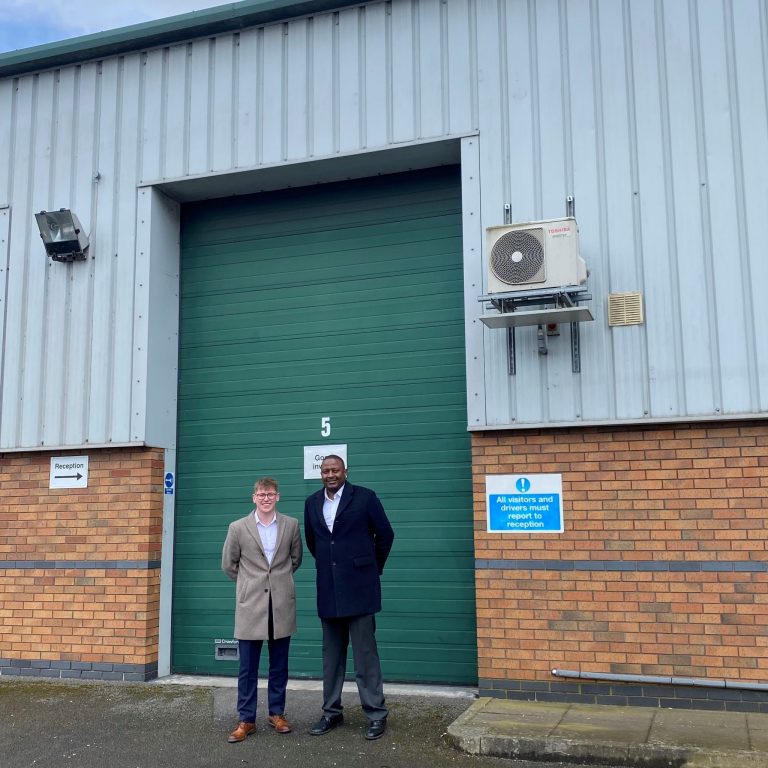Paper business lets Burton industrial unit
Doncaster firm sold to Brazilian owners with help of Shorts of Chesterfield
Grants of up to £10,000 available to Northamptonshire businesses
Nottingham Venues selected to host UDine Awards
Nottingham Venues has been selected as the host venue for the upcoming UDine Awards. Up to 130 people from across the UK’s university hospitality sector will attend the event at Nottingham Venues’ Orchard Hotel on Tuesday 20 June. The event will be hosted by celebrity chef, restaurateur, and TV host Simon Rimmer.
The UDine awards are a joint initiative between Inside Foodservice and University Hospitality Seminars. The annual event celebrates excellence in the university hospitality sector and recognises the organisations that are leading the way in the industry.
Prior to the awards, Udine and Nottingham Venues will host an afternoon of networking and a series of seminars where leaders within the industry can discuss sector issues and share best practice. Sustainability is high on the agenda, and the Orchard Hotel’s strong environmental credentials and focus on reducing its environmental impact is one of the reasons it was chosen as the host venue.
In addition to hosting the event, Nottingham Venues has also put the Orchard Hotel forward for the University Hotel Award. Located within the University of Nottingham campus, the 4* eco-friendly hotel comprises 202 bedrooms, 6 meeting rooms, a restaurant and welcomes thousands of business and leisure guests each year.
Tom Waldron-Lynch, general manager of Nottingham Venues, says: “The Udine Awards are a landmark event within the university hospitality sector, and I am delighted that we will be hosting the event this year.
“Over the past year, the Nottingham Venues team has been focussed on putting our venues on the map in terms of the quality of provision we can offer industry award organisers, so I’m pleased that the organisers of the most significant awards in our sector has chosen to partner with us for the 2023 Udine Awards.”
David McKown MBE, director of the UDine Awards, adds: “Nottingham Venues’ facilities and its location within the grounds of the University of Nottingham made it the perfect location for this year’s awards. Sustainability is a huge issue within our industry, and we therefore also wanted to partner with a venue that put sustainability at the heart of its service.”
12 speakers confirmed for free day-long ‘Survive and Thrive’ event for SMEs
Expert speakers who will share tips on how to ‘survive and thrive’ in business in 2023 have now been confirmed for a free event next week.
The one-off conference has been organised by the Business Gateway Growth Hub and will be hosted by LLEP Board Members Glynis Wright MBE and Sonia Baigent.
It takes place on Tuesday April 18, at Leicester’s Morningside Arena and will cover a variety of cost-saving themes and explore possible solutions to current pain points faced by local firms.
This will include effective workforces, managing energy costs, and leading in challenging times.
There are still some places left for businesses to register now to attend the event.
Business owner and qualified accountant Sonia has provided business consultancy and support to SMEs for more than 15 years.
She will give her own talk, using ‘real life’ examples and success stories, as will local business leader and qualified solicitor Glynis. Also taking to the stage will be:
- Caitlin Davies – Microsoft UK
- Steven Mather – Steven Mather Solicitor
- Azar Khan – Axiom Energy
- Anna Cyhan – LLEP Skills
- Alpa Chauhan and Sally Drew – Leicester Employment Hub
- Sally Newnham – Mental Health and Productivity Pilot
- Christiane Startin-Lorent – Carbon Literacy Advocate and Trainer
- Stu Spencer – Charnwood Accountants
- Sam Goddard – St James Systems
- Saleem Arif – ReviewSolicitors
Presentation topics include recruitment, negotiating energy contracts, navigating debt, financial resilience, productivity hacks, and more.
Sonia said: “With such a strong roster of speakers and stallholders, business owners and attendees will leave the expo feeling positive and motivated. They will also be armed with useful tips that they can use to strengthen their position.
“The current cost of doing business means local owners and directors are facing a daily challenge to manage the needs of both their business and its stakeholders.
“My session will look at how you can bring focus and clarity to everyday decisions, as well as covering the support and options available to businesses in times of distress.
“Our other speakers will also draw from their experiences to offer practical advice and tips on how to access support.
“The purpose of the event is to signpost business owners to available support, whilst also providing practical tools and tips to help manage the current cost of doing business during the cost of living crisis.”
There will be an expo outside of organisations offering free help and support to local businesses. Universities, banks, networks and trade bodies are among confirmed stallholders so far. They include:
- ACAS
- Axiom Energy
- Barclays Eagle Labs
- Centre for Organisational Resilience
- East Midlands Chamber
- Embark CSR
- Federation of Small Businesses
- Leicester and Leicestershire Enterprise Partnership
- Leicester City Council
- LUInc (Loughborough University business incubator for the LLEP-supported Wayfinder programme)
- NatWest
- ReviewSolicitors
- Sir Thomas White Loan Charity
- Steven Mather Solicitor
- The Anderson Partnership
- University of Leicester School of Business
Sonia added: “Over the last few years, the challenges of running a business have grown. The fallout from the pandemic, high inflation, impossible energy hikes – it’s all taken its toll. We aim to provide practical advice that can be used immediately, for businesses to survive and grow in 2023 and beyond.”
Reserve your ticket nowDSP (Interiors) unveils new agile offices for Surescreen Diagnostics
Trio of promotions for Nottingham accountancy firm
Nottingham-based chartered accountants, Clayton & Brewill, has promoted three of its senior team to directors, in line with the next phase of its succession plans.
Promoted to directors are the firm’s Amanda Stefanetti, Rebecca Higginbottom and Adam Rostance.
Having obtained her ACA qualification at Newby Castleman, Amanda Stefanetti joined Clayton & Brewill in 2008, where she went on to achieve FCA status. In her role at the firm, Amanda works with SMEs and their directors, assisting them with accounts preparation, management accounts, VAT returns and company and personal tax returns.
Prior to Clayton & Brewill, Rebecca Higginbottom previously worked for Hyett & Langfield. When the firm was acquired by Clayton & Brewill in 2003, she continued in her account manager role and went on to achieve her AAT, ACA and FCA qualifications. At Clayton & Brewill, Rebecca undertakes a wide range of accountancy services, including management accounts, year-end reporting, and personal and corporate taxes.
Adam Rostance joined Clayton & Brewill in June 2012 as an AAT apprentice. After initially working within the firm’s compliance department, Adam transferred to the audit department as an audit junior, working his way up to the role of accounts and audit manager. He now oversees a portfolio of clients ranging from small sole traders to large group companies.
Doug Perry, partner at Clayton & Brewill, says: “Amanda, Rebecca and Adam are highly valued members of the team, fantastic ambassadors for the firm, and exceptionally talented accountants. As well as delivering an excellent service to meet varying client needs, they provide a robust support network for the firm’s partners. These promotions recognise their commitment to Clayton & Brewill and the diligence they have shown over the years.”












